For millions of UK pensioners, the government’s Triple Lock promise is a vital safeguard, designed to ensure their state pension keeps pace with the rising cost of living. Next year, the mechanism is set to deliver a significant cash increase. However, a stark warning from experts suggests that for many, this boost could be an illusion, swallowed whole by relentless price hikes on essentials.
The Department for Work and Pensions (DWP) has confirmed the Triple Lock will be honoured, based on last September’s earnings growth figure of 8.5%. This means:
The New State Pension will rise from £11,502 to over £12,500 a year.
The Basic State Pension will increase from £8,812 to over £9,500 a year.
On paper, this is a welcome injection of cash. But looking closer, a worrying picture emerges. Financial analysts and campaigners are highlighting a harsh reality: the increase may not be enough to counteract the cumulative effect of inflation on key household bills.
Why the Numbers Don’t Add Up
The core of the problem lies in where inflation is hitting hardest. While the overall inflation rate has fallen, the cost of fundamental necessities—particularly food and energy—remains stubbornly high.
Baroness Ros Altmann, a former Pensions Minister, underscored this concern. “Undoubtedly, there will be many pensioners who will be worse off next year,” she stated. “Food, basics for housing, energy, and insurances are rising faster than many other prices, and further price rises will hit lower-income pensioners the most.”
This sentiment is echoed by Dennis Reed, Director of the campaign group Silver Voices. He points out that last year’s increase was immediately absorbed by utility bills and council tax. “Food profiteering by the supermarket giants continues to force poor pensioners to skimp meals and use food banks,” Reed added.
A Squeeze on the Most Vulnerable
The situation is most acute for those solely or heavily reliant on the state pension. Charlene Young, a pensions expert at AJ Bell, explains that these households spend a much larger proportion of their income on essentials.
“Those on the lowest incomes are most sensitive to rises in food and energy costs, as these make up a far bigger proportion of their spending,” Young said. “For them, the headline pension increase doesn’t translate to more disposable income; it simply goes towards covering bills that have already risen.”
What Can Pensioners Do?
In this challenging climate, ensuring you are receiving every penny of support you are entitled to is more critical than ever. Experts strongly advise pensioners to:
Check for Pension Credit: This is a vital, often under-claimed benefit that tops up your weekly income. It can also act as a gateway to other support, such as help with council tax, housing costs, and a free TV licence if you’re over 75.
Review Council Tax Support: Contact your local council to see if you qualify for a reduction based on your income.
Ensure Winter Fuel Payments: If you are of state pension age, you should automatically receive this payment to help with heating costs during the colder months.
The Triple Lock increase, while welcome, is not a magic bullet. For thousands, the financial pressure is set to continue, highlighting a deepening crisis for those on fixed incomes.
Answers to “People Also Ask” Questions on Google Search
Q: What is the Triple Lock on the UK state pension?
A: The Triple Lock is a government guarantee that the state pension will increase each year by the highest of three figures: the rate of inflation (Consumer Prices Index), the average increase in wages across the UK, or 2.5%. It’s designed to protect pensioners’ purchasing power.
Q: How much will the state pension be in 2025?
A: Based on the confirmed Triple Lock calculation for the 2025/26 tax year, the full New State Pension is expected to rise to over £12,500 per year (from £11,502). The full Basic State Pension is expected to increase to over £9,500 per year (from £8,812). The exact amounts will be confirmed later in the year.
Q: Why are pensioners still struggling with the Triple Lock?
A: Although the pension increases, the cost of essential items like food, energy, and insurance has been rising at a faster rate than the overall inflation figure used in some calculations. This means the real-world purchasing power of the pension can decrease, especially for those who spend most of their income on these basics.
Q: What help is available for pensioners on a low income?
A: Key benefits include:
Pension Credit: Tops up your weekly income and can provide access to other support.
Council Tax Reduction: A discount on your council tax bill, applied for through your local council.
Winter Fuel Payment: An annual tax-free payment to help with heating costs.
Cold Weather Payments: Paid during periods of very cold weather if you’re on certain benefits.
Attendance Allowance: For those who have reached state pension age and need help with personal care due to illness or disability.
